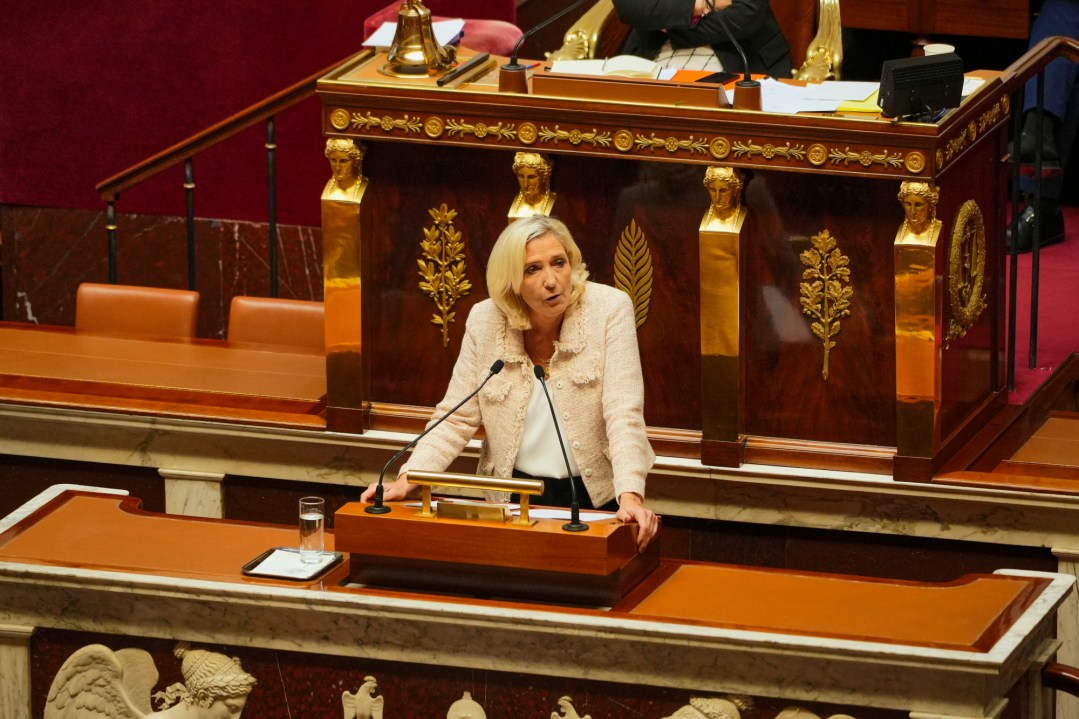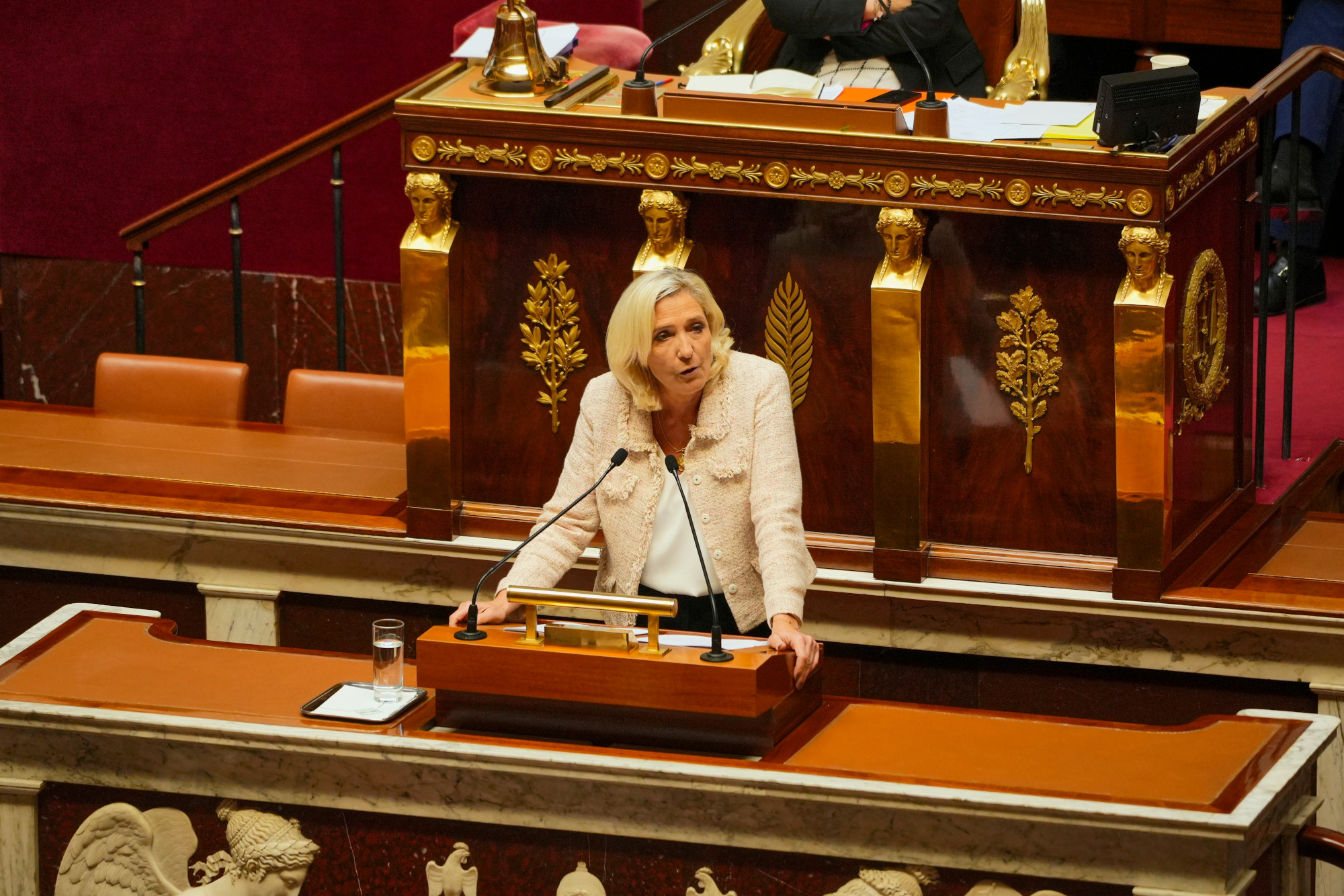Emmanuel Macron projects authority, but he’s trapped. After the collapse of François Bayrou’s government yesterday evening, Macron faces a divided parliament, hostile blocs on both sides, and no obvious way forward. After the crushing no-confidence vote, Macron insists that he will appoint a new prime minister ‘in the coming days’. But appointing a successor without dissolving parliament won’t resolve anything. Without a clear majority, any new government would face the same hostile Assembly and the same threat of immediate censure as his previous appointees. The numbers don’t change just because the names do. Each option Macron explores risks failure. Increasingly, it is Marine Le Pen, and the choices she makes, that will decide what happens next.
The National Assembly is split into three blocs, and yesterday’s no-confidence vote made the balance brutally clear, exposing just how little room Macron has to manoeuvre. The vote confirmed that his bloc cannot govern alone and that, in practice, Marine Le Pen’s National Rally now holds the leverage to decide what survives and what falls. Power is shifting quietly but decisively – Macron’s fragile Renaissance coalition lacks the numbers to survive without outside support, while both the left and the National Rally are now emboldened to block any centrist compromise. Macron’s fragile Renaissance coalition, the left under Jean-Luc Mélenchon, and Le Pen’s National Rally. None can govern alone. None wants to compromise.
Bayrou was supposed to be the bridge, the compromise candidate who could hold together a fragile centre and steer Macron’s project forward. Before him, it was Michel Barnier, chosen for his perceived ability to bring the right on board without alienating the left. Both were considered the right men for the job. Both failed, each brought down by the same parliamentary deadlock. Any new prime minister inherits the same deadlock and the same fate.
The candidates being floated illustrate the trap Macron is in. Behind the scenes, the Élysée has begun testing names with allies and opponents, but each comes with built-in resistance and political risk. Macron is fighting to defend his politics and salvage what remains of Macronism, which was the centrist project he built to block both the far right and the far left.
The consensus is that any viable pick would almost certainly have to come from within his own fragile bloc. Gérald Darmanin, Macron’s interior minister, appeals to the right, but would alienate the left. Sébastien Lecornu, the defence minister, is loyal and discreet but lacks authority. Xavier Bertrand, a seasoned conservative, could bring centre-right support, but risks splitting Macron’s own Renaissance bloc. The Socialists floated Olivier Faure as a potential prime minister, but both Les Républicains and the National Rally immediately shut it down. LR’s Bruno Retailleau warned: ‘It’s out of the question for us on the right to accept the appointment of a Socialist prime minister’. RN spokesman Sébastien Chenu was equally blunt, saying they would ‘never support a Socialist at Matignon’ and would ‘censure such a government without hesitation’.
That leaves Macron without a candidate who can survive a divided Assembly. And that’s why Marine Le Pen is playing such a careful game. She hints at censure but stops short of making explicit threats, knowing that any perception of overreach could backfire. Her real aim is to force new parliamentary elections, put a National Rally prime minister into Matignon, and lay the groundwork for a serious bid for the presidency in 2027.
Le Pen has framed new elections as a constitutional duty rather than a political choice: ‘A president is never wrong to turn back to the people. Dissolution is not a whim; it’s an institutional lever to break the deadlock and restore democratic functioning.’
Le Pen doesn’t need to force Macron’s hand. She can just wait. Yesterday’s no-confidence vote underlined the point that without the National Rally abstaining, no prime minister can last. By refusing to commit either way, Le Pen has made herself the quiet arbiter of France’s political future.
Meanwhile, time is running out. Under French fiscal rules, the 2026 budget must be submitted by early October. A caretaker government cannot propose a new budget. Miss the deadline, and last year’s budget rolls over unchanged, widening the €44 billion deficit, provoking Brussels, and risking a downgrade. Fitch has already warned of ‘heightened risks’; Moody’s has flagged the political paralysis. Bond yields are rising above 3.2 per cent.
The streets are bracing for unrest. Tomorrow, the Bloquons Tout movement, a decentralised protest network, begins blockades. The group is now largely controlled by the hard left who are increasingly motivated to cause chaos now that the stakes are higher for them than just a new budget. At stake is power and who will control the next government. From 18 September, eight major unions will launch coordinated national strikes. What began as anger over Bayrou’s budget has morphed into demands for elections.
Macron can float names, play for time, and cultivate ambiguity. But ambiguity now looks like weakness. Without dissolution, there’s no budget, no mandate, and no way out. Marine Le Pen’s National Rally doesn’t yet hold the presidency, but it’s already setting the tempo. Whether Macron likes it or not, Le Pen is increasingly the one calling the shots.








Comments